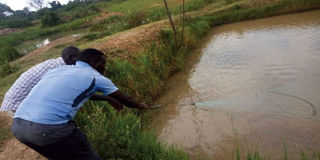Prime
Losing my job opened my eyes to fish farming - Oyuruka

Oyuruka (left) casts a net to catch fish from his pond. Photo | Suzan Nanjala
What you need to know:
- Apart from the two fish ponds that Charles Oyuruka started with, he now owns at least 10 fish ponds in Ngora Town Council, besides that he has managed to share with the common people.
Charles Oyuruka, aka Etesot 57, the interim chairperson for fisheries in Ngora Town Council could not sit back after losing his job at Teso Rural Development Organisation in Ngora.
Just like any other person Oyuruka says it did not go well with him after losing his juicy job in 2003 as the programme manager but that did not mean it was the end of his life.
Before engaging in fish farming he was involved in maize farming (growing maize on a large scale) as a commercial farmer.
“With the view that I had about fish farming in the future I was forced to start it prematurely but I am happy I have gained what I did not expect,” he says. He thought of this project because of its potential value and all this he learnt when he was still at school. Amid the tough economic climate, he could not go on without any income generating activity, so he made the best use of the knowledge he acquired from school.
Start-up capital
With the savings he had made from his maize proceeds he started with just two fish ponds at Shs3m. He dug shallow holes, bought fingerlings, feeds and also brought people from Mbale who helped him excavate the ponds.
When he began this project in 2008, digging the fish ponds was not so costly. He used about Shs300,000 to Shs1m for the first two, which took him about two months to complete.
“Unlike before, digging the fish ponds was cheaper than now where you have to part with about Shs5m to Shs7m for a single fish pond,” Oyuruka says.
He started with tilapia and catfish which in return gave him much more than he had expected.
Benefits
Acquiring acres of land is among the achievements he has got ever since he started farming.
“I have bought acres of land from all parts of Teso region including in Serere District,” he happily shares.
Apart from the two fish ponds that he started with, he now owns at least 10 fish ponds in Ngora Town Council, besides that he has managed to share with the common people.
People come to him for guidance on fish farming and he gives without any charge because he wants them to benefit too. Being an education person, he believes in empowering others so that all can fight poverty.
Oyuruka says he has brought on board about 50 people including graduates who have learnt that the project is a reliable source of income.
Most of them learn from him and some of them are people he knew when they were still young but they have gained experience from him.
“Some of them, if they don’t have capital I give them as loans and they pay back when they have started harvesting the fish,” Oyuruka says.
Market
He hopes to widen his supply very soon because the demand is very high. What he produces is consumed locally and still it’s not enough for the population. He says fish is nutritious and most of the people there prefer it to meat because of the health complications.

Oyuruka displays some of the cat fish upon harvest from his pond
“With the 10 fish ponds I now have, I think I will be able to sell outside Ngora because between February and March, I really hope it will be a bumper harvest for me,” he says.
He also says his fish tastes different from the ones caught in lakes and other water bodies, which explains the high demand.
Challenges
Just like any other business, Oyuruka says he encounters stumbling blocks as a fish farmer but that does not mean he should give up. This even makes him stronger and his thinking capacity broadens.
Weather can be so challenging that when it rains heavily the fish can easily be washed away. He remembers one time when he almost lost all the fish in the ponds.
“I almost gave up when I lost a lot of fish during the heavy downpour,” he recalls.
He says the fish ponds are meant to be shallow but he has decided to make his a bit deeper to avoid the same incidence happening to him. Slow growing fish can be so stressful, so sometimes choosing the right quality of the fish can be challenging. He says he has two fish ponds where fish feeds but they do not grow like others do.
Maintenance of the banks is another challenge to him, the banks are sometimes washed away forcing him to re-plough. Predators, birds and thieves are all over but he has employed two watchmen who keep watch day and night. Finally the biggest challenge Oyuruka and others farmers in Ngora face is lack of extension workers and the ones there reportedly always busy and unable meet the demand of the fish farmers.
Support
His children have been of great support and they involve themselves in the activities, so when he is not around, he has nothing to worry about. His two children who are both graduates from different fields (Bachelors of Science in Accounting and Finance and Bachelor of Science in Land Survey) did not have to look for jobs as the jobs are readily available for them.
“One of my children had nothing to do after his course and I trained him how to work and he has been of great help,” he says. The community has been of great help to Oyuruka and without them, things would not have been that much easier for him.
Future plans
“We need to come (together) as a team to attract the government in supporting the fish farmers,” Oyuruka says. He advises the youth and other people to join fish farming for it’s a business that has ready market.
Advice
Oyuruka says that exceptional taste and hardy resistance to disease and parasites make catfish another good choice for beginning fish farmers.
Catfish grow quickly — a large fingerling can reach 1 pound (450 grammes) or nearly half a kilo) within five months, so he advises those who want to begin fish farming to start with these. “They multiply very fast and you don’t spend a lot on feeding them because you can decide to feed them once in a day and still gain out of them,” Oyuruka advises.
Best practices
Feeds are an important component of fish farming as they constitute more than 70 per cent of the total operational costs. As a result, the key to any commercial fish farmer is always to use the best feeds but also maximise on all fronts and keep the ‘wastage taps’ at minimum.
Sourcing for the right feeds, record keeping of the trend in feeding, maintaining hygiene around and inside the pond are some of the best practices that farmers are advised to observe by experts in order to reap big from the trade.
Another paramount exercise that farmers are advised to observe is embrace best fish feeding method. According to Susan Nakimu from Ugachick, Uganda’s biggest fish feed producer, the best fish feed method is Feed by Response where fishes are fed according and when they are hungry. This ensures that the feeds go directly to the fish and not the predators as well as maintaining hygiene in the pond.




